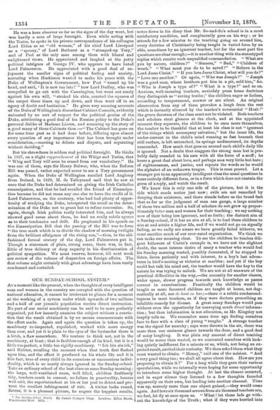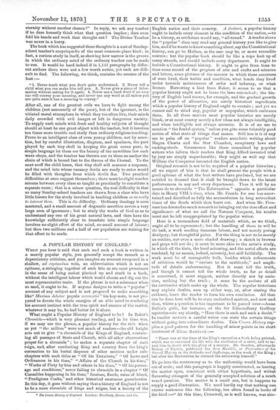OUR SUNDAY-SCHOOL SYSTEM.*
AT a moment like the present, when the thoughts of every intelligent man and woman in the country are occupied with the question of national education, it cannot be irrelevant to glance for a moment at the working of a system under which upwards of two millions and a half of our juvenile population receive direct instruction. No part of our social machinery can be said to be more perfectly organized, yet few honestly examine the subject without a convic- tion that the result obtained is by no means commensurate with the effort made. Again and again the question is taken up, the machinery re-inspected, repolished, worked with more energy than ever, and yet it is plain to the eyes of the bystander there is a hitch, a flaw somewhere. We venture to think not, not in the machinery, at least ; that is faultless enough of its kind, but it is a little too perfect, a little too rigidly machinery. " Ich bin em n ich," said Richter, recalling the moment when that truth first flashed upon him, and the effect it produced on his whole life and it is this fact, true of every child in its conscious or unconscious indivi- duality, which is so nearly always ignored in the Sunday-school. Take an ordinary school of the best class on some Sunday morning ; the large, well-ventilated room, well filled, children faultlessly tidy, teachers much in earnest, no failure in punctuality, lessons well said, the superintendent at his or her post to detect and pre- vent the smallest infringement of rule. A visitor, looks round, listens, it is a pleasant picture, he augurs the happiest results, • The Sunday-School World. By James Comper Gray. London: Elliot Stook, Eaternoster Row. 1871. .
notes down in his diary that Mr. So-and-So's school is in a most satisfactory condition, and complacently goes on his way ; or he attends for a few minutes to the teaching going on around him, every doctrine of Christianity being taught in varied form by an able, sometimes by an ignorant teacher, but for the most part the questions are clear enough ;—it is another thing with the stereotyped replies which receive such unqualified commendation. "What are you by nature, children ?" "Sinners," "Bad," "Children of wrath." "What must you do to be saved?" "Believe in the Lord Jesus Christ." "If you love Jesus Christ, what will you do?"
"Love one another." Or again, "Who was Joseph?" "Joseph was a good man, whose brothers put him in a pit, sold him," &c.
"Who is Joseph a type of?" "What is a type ?" and so on. Anxious, well-meaning teachers, anxioisly press home doctrines they distinguish as "saving truths ;" the children eager or listless, according to temperament, answer or are silent. An original observation from any of them provokes a laugh from the rest which is instantly silenced by the teacher's reverential "Hush I" the grave decorum of the class must not be violated. Both teachers and scholars steal glances at the clock, and at the appointed moment they separate, the children to be once more themselves, the teacher to be thankful that at least his class is not "ignorant of the things which accompany salvation," but the inner life, the
under-current in the child's mind running so fast beneath that still surface, is left untouched, its springs undiscovered, its depths unsounded. How much that goes on around each child's daily life is ignored. Not a doubt that staggers the strong man but is pro- bably daily sounded in his ears with all the force of a scoff ; he hears a great deal about love, and perhaps sees very little but hate ; of righteousness, and justice, and repeats the words as he would the alphabet of an unknown tongue. This is soon proved. Let a stranger put to an apparently intelligent class the usual questions in some entirely different form, or in a form which does not contain the germ of a reply, and watch the result.
We know this is only one side of the picture, but it is the side which needs notice just now ; evils are not remedied by denying their existence, and there stands before us the broad fact that as far as the judgment of man can gauge, a large number of these two million and a half of scholars do not grow up propor- tionately better men and women for their teaching ; we say nothing now of their being less ignorant, and so forth ; the distinct aim of a Sunday-school, if it has an aim at all, is to lead these children to aim at and attain a higher life, and if we would not go on signally failing, as we sadly are aware we have greatly failed hitherto, we must sacrifice much of our over-rated organization. We think we can make our meaning clear. To see the children he teaches dili- gent followers of Christ's example is, we have not the slightest doubt, the most intense dire of many a teacher who would feel his Sunday morning wasted, possibly desecrated, if he stopped to listen, listen patiently and with interest, to a boy's last adven- tures in bird's-nesting or victories at marbles ; and yet if the bey could but talk his mind out, the teacher would have the key to the nature he was trying to unlock. We are not at all unaware of the practical difficulties in the way,—the necessity for smaller classes, wider space, slower progress towards such knowledge as passes current in examinations. Practically the children would be taught as more favoured children are taught at home, not dog- matically at all, not de haut en bas;—there is a subtle condescend- ingness in most teachers, as if they were doctors prescribing an infallible remedy for disease. A great many Sundays would pass without even the opportunity for conveying much direct informa- tion; but then information is not education, as Mr. Kingsley not inaptly tells us. We remember some time ago finding ourselves face to face with a class of young "roughs." A strange teacher was the signal for anarchy ; caps were thrown in the air, there was more than one ominous glance towards the door, and a good deal of noisy laughing. It was plain any amount of direct teaching would be worse than wasted, so we contented ourselves with look- ing quietly indifferent for a minute or so, which, not being an ex- pected result, excited their curiosity. We then asked them what they most wanted to obtain. "Money," said one of the noisiest. "And a very good thing too ; we shall all agree about that. How are you proposing to obtain it ?" For a long while they gave their various speculations, while we internally were hoping for some opportunity to introduce some higher thought. At last the chance occurred, and in eager silence they listened to a few thoughts founded apparently on their own, but leading into another channel. Time was up, scarcely more than one object gained,—they would come again. And here six thousand arrows from six thousand teachers are, we feel, let fly at once upon us. " What I let those lads go with- out the knowledge of the Truth ; what if they were hurried into
eternity without another chance?" In reply, we ask any teacher if he dare honestly think what that question implies ; dare even fold his hands and work that thought out? The Divine Teacher was never in a hurry.
The book which has suggested these thoughts is a sort of Sunday- school teacher's encyclopmdia of the most common-place kind ; in
fact, a curious study in itself, as showing how narrow is the groove in which the ordinary mind of the ordinary teacher can be made to run. It would be hard indeed if in 1,141 paragraphs by differ- ent authors there were not a few worth notice, yet such are diffi- cult to find. The following, we think, contains the essence of the best :— "1. Never teach what you don't quite understand. 2. Never tell a child what you can make him tell you. 3. Never give a piece of infor- mation without asking for it again. 4. Never use a hard word if an easy one will convey your meaning, and never use any word at all unless you are quite sure it has a meaning to convey."
After all, one of the greatest evils we have to fight among the children (not necessarily of the poor), but of the ignorant, is the vitiated moral atmosphere in which they too often live, their minds daily crowded with evil images or left in dangerous vacuity.
To supply such minds with fresh and healthy subjects of thought should at least be one great object with the teacher, but it involves ten times more trouble and study than ordinary religious teaching. Prove to an intelligent class of even young children, not by asser- tion, but by careful illustration, diagram, and specimen, the part played by each tiny shell in keeping the great ocean pure, in simple language let them see the beauty of the unwritten law each wave obeys, and the teacher has thrown out to them an anchor the chain of which is bound fast to the throne of the Eternal. To the next scoff the child hears, that tiny shell will murmur a response, and the mind into whose vacancy devils are ready to enter would be filled with thoughts from which devils flee. Two practical difficulties at once suggest themselves ; there must be slight wooden screens between every class so taught as practically to constitute a separate room ; that is a minor question, the real difficulty is that so many Sunday-school teachers are drawn from a class who have little leisure for the study involved in teaching children so as really to interest them. This is the difficulty. Ordinary theology is soon mastered, and a small amount of dogmatic assertion covers a very large area of ignorance ; but to study the works of God so as to understand any one of his great natural laws, and then have the knowledge sufficiently clear to translate into simple language involves no slight effort of the mind, no small amount of labour ; but then two millions and a half of our population are waiting for that effort to be made.



































 Previous page
Previous page